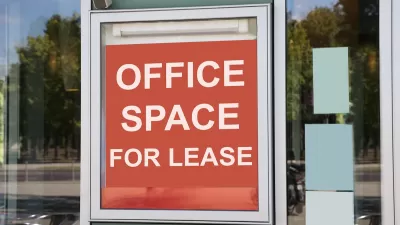Workplaces that employees can reach more quickly are less likely to have high office vacancy rates, a new analysis finds.

An analysis from Moody’s Analytics reveals that metro areas with shorter commute times have lower office vacancy rates, reports Erik Sherman for Globe St. While the analysis acknowledges the role of many other factors in office vacancy and downtown recovery, “ we continue to hear chatter that firms are more reluctant to maintain/expand space in metros where employees have greater difficulty getting to the office.”
According to the analysis, “Four of the top five metros with the largest office vacancy rate decreases were Rust Belt cities including Dayton, Buffalo, Cleveland, and Rochester. At least as of 2021, Dayton, Buffalo, and Rochester featured above average share of commutes less than 15 minutes of one-third or greater.”
On the other end of the spectrum, “four of the bottom 5 metros (San Francisco, Charlotte, Austin, and Louisville) have a share of commutes less than 15 minutes at or below the average of one-quarter with San Francisco having the lowest share of 15%.”
FULL STORY: Short Commutes Help Reduce Office Vacancy Rates

Maui's Vacation Rental Debate Turns Ugly
Verbal attacks, misinformation campaigns and fistfights plague a high-stakes debate to convert thousands of vacation rentals into long-term housing.

Planetizen Federal Action Tracker
A weekly monitor of how Trump’s orders and actions are impacting planners and planning in America.

In Urban Planning, AI Prompting Could be the New Design Thinking
Creativity has long been key to great urban design. What if we see AI as our new creative partner?

Pedestrian Deaths Drop, Remain Twice as High as in 2009
Fatalities declined by 4 percent in 2024, but the U.S. is still nowhere close to ‘Vision Zero.’

King County Supportive Housing Program Offers Hope for Unhoused Residents
The county is taking a ‘Housing First’ approach that prioritizes getting people into housing, then offering wraparound supportive services.

Researchers Use AI to Get Clearer Picture of US Housing
Analysts are using artificial intelligence to supercharge their research by allowing them to comb through data faster. Though these AI tools can be error prone, they save time and housing researchers are optimistic about the future.
Urban Design for Planners 1: Software Tools
This six-course series explores essential urban design concepts using open source software and equips planners with the tools they need to participate fully in the urban design process.
Planning for Universal Design
Learn the tools for implementing Universal Design in planning regulations.
planning NEXT
Appalachian Highlands Housing Partners
Mpact (founded as Rail~Volution)
City of Camden Redevelopment Agency
City of Astoria
City of Portland
City of Laramie





























